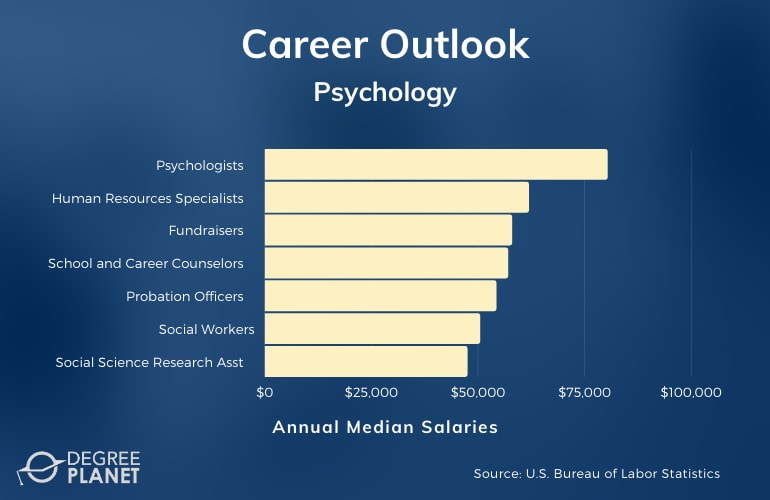Is a psychology degree worth it? If you want to learn what shapes people’s thoughts and behaviors, then you’ll likely find psychology to be a fascinating topic that’s worth studying.

Editorial Listing ShortCode:
The lessons you can learn in a psychology program may translate to jobs in social services, criminal justice, education, business and other sectors. They can also help prepare you for graduate studies in psychology or a related field.
Is a Psychology Degree Worth It?

Yes, a psychology degree is worth it for many students. The Bureau of Labor Statistics is projecting 5% job growth in life, physical, and social science occupations over the next 10 years.
Common psychology careers in this field include psychologist, psychiatric technician, correctional treatment specialist, social worker, and human resources specialist. Perhaps you’re thinking about a psychology degree because you want a job as a therapist or a psychologist. A bachelor’s degree often provides a strong start for that career path.
Most therapy and counseling positions require a master’s degree, and being a psychologist depends on having a doctorate. Admissions committees for such programs may appreciate that your undergrad work was in the psychology field.
Don’t think, though, that you won’t be able to start helping people until you’ve completed graduate studies. There are many entry-level opportunities for those with a bachelor’s degree. For example, you might work alongside a licensed professional as a psychiatric technician or aide.
Editorial Listing ShortCode:
Some states allow people with a bachelor’s degree to become licensed as substance abuse counselors.
Psychology can also be a useful bachelor’s program for human and social service jobs. You might start as a social worker or an assistant. Being a social worker may require additional training, but your psychology degree can provide a good start.
Your background in psychology could also help you become a probation officer or a correctional treatment specialist who helps offenders get back on the right track.
Psychology can even be useful for launching a career in business. Knowing how people think and behave may help you negotiate contracts, settle disputes, sell products, communicate with investors, make loan decisions, raise funds or interview job candidates.
How to Decide Whether a Psychology Degree is Right for You

Psychology is an interesting topic, so many college students consider making it their major.
1. You want to help people.
Counseling is one of the most popular career paths for people who study psychology.
If your eventual goal is to get a doctorate and become a licensed psychologist, then a bachelor’s degree in psychology may be a smart way to start your college journey. Counseling or clinical psychologists work one-on-one with clients or run group therapy sessions.
Even if you don’t want to become a full-fledged psychologist, there are plenty of other ways to help people with a psychology degree.
You might get a job as a case manager or a program supervisor in human services. Other options include being a parole officer, an addiction counselor, or an assistant in a psychologist’s office.
2. You’re interested in human thought and behavior.

Psychology is a broad field, but each branch is united by the common themes of human thought and behavior. Common topics of study in psychology programs are human development, behavioral theories, personality, and cognition.
The more you know about psychology, the better you can understand yourself and others. This may help you improve at communicating clearly, building relationships and wielding influence.
These skills can help you be successful in the business world. Human resources directors, marketing professionals and salespeople can benefit from a good understanding of psychology.
For those who have their sights set on a PhD, it’s worth noting that being a psychologist won’t lock you into a counseling career. There are different types of psychologists, and many of these professionals use their advanced knowledge to benefit schools, private companies, or the criminal justice system.
3. You enjoy writing and research.

Psychology is a scientific discipline, so most programs include a significant research component. You will likely study others’ research and also learn how to perform your own research. There may be classes on statistical analysis as well.
Psychology majors also do a lot of writing during their time in school. This may include reports on the lab work that you conduct as well as critical responses to others’ studies. Honing your research and writing skills can serve you well after college. Plus, psychology is a good major in that it could help you find work as a research assistant or a technical writer.
5 Things You Can Do with a Psychology Degree
Psychology may be one of the most versatile degree programs out there because understanding thought and behavior can help you communicate with people in nearly any setting.
Editorial Listing ShortCode:
Whether you want to get advanced training or enter the workforce right away, there may be a psychology job out there for you.
1. Psychologist

The first job that may come to mind when you hear about psychology degrees is that of a psychologist. Some psychologists specialize in clinical or counseling work.
Others use their psychology skills in different contexts. Industrial-organizational psychologists improve workplace practices. Forensic psychologists are involved with crime investigation. Getting a bachelor’s degree is just the first step to becoming a licensed psychologist. You’ll need to complete a doctoral program before licensure.
2. Psychiatric Technician

You might get a job in a mental health or addiction facility as a psychiatric technician or aide. These roles can give you opportunities to work alongside mental health professionals and learn from their expertise.
Responsibilities as a psychiatric technician may include leading activities, administering medication, interacting with patients, assisting with basic needs and recording notes on clients’ behavior. To work as a technician, you may need to complete a certification program.
3. Correctional Treatment Specialist

You may use your psychology background to help people move forward with their lives after a criminal conviction.
Meeting one-on-one with people who are on probation or parole, correctional treatment specialists conduct tests and interviews to evaluate whether they have been rehabilitated. They also run programs to help offenders get back on their feet. Similar jobs you could pursue with a psychology degree include parole officer and probation officer.
4. Social Worker

To help people who need extra support from community services, consider a job as a social worker. Although social work jobs are often available to people with psychology backgrounds, you may need to start as an assistant or undergo additional training.
If you find that social work is a good fit for you, consider becoming a licensed clinical social worker by getting a Master of Social Work (MSW).
5. Human Resources Specialist

Because of their understanding of people and relationships, psychology students often find success in the business world. Human resources is a top field to consider. You might be good at interviewing candidates or settling disputes between coworkers.
Labor relations is a subspecialty of human resources that you might be particularly well-suited for. A labor relations specialist serves as a liaison between a company and a union to negotiate contracts and resolve disagreements.
Psychology Degree Alternatives

Although psychology is a versatile degree, it’s not the only course of study for those who want to help other people or explore human thought and behavior.
- Bachelor’s in Social Work. While psychology students may need extra training to be approved as a social worker, having a bachelor’s in this field may qualify you for certain jobs in this field more quickly.
- Bachelor’s in Sociology. In a sociology program, you can study human behavior, particularly in groups. This degree might prepare you for a career in social services, public relations, market research, or consumer advocacy.
- Bachelor’s in Counseling. For those who want to become marriage and family therapists or rehabilitation counselors, a counseling bachelor’s degree may provide the best foundation for the necessary master’s studies.
There is a good deal of overlap between these fields, so no matter which one you choose, you should have plenty of career options to explore.
Psychology Careers & Salaries

According to the Bureau of Labor Statistics, psychologists earn an average annual salary of $82,180.
| Careers | Annual Median Salaries |
| Psychologists | $82,180 |
| Human Resources Specialists | $63,490 |
| Fundraisers | $59,610 |
| School and Career Counselors | $58,120 |
| Probation Officers and Correctional Treatment Specialists | $55,690 |
| Social Workers | $51,760 |
| Social Science Research Assistants | $49,210 |
| Substance Abuse, Behavioral Disorder and Mental Health Counselors | $47,660 |
| Social and Human Service Assistants | $35,960 |
| Psychiatric Technicians and Aides | $33,140 |
Some of these jobs for psychology majors can be done with only a bachelor’s degree, but being a counselor or a psychologist usually requires earning a master’s degree or a doctorate.
A growing number of universities even offer dual masters and PhD programs in psychology online, as well through traditional classroom programs. It may be worth it for you to check into these accelerated options.
What Can You Do With a Bachelors in Psychology?

People with a psychology major work in a wide variety of roles. Some pursue master’s or doctoral degrees so they can work as industrial-organizational psychologists, school counselors, or clinical psychologists.
If those fields interest you, but you aren’t ready for a graduate degree just yet, you could pursue work as a psychiatric aide or a social science research assistant. Similar lines of work include social worker, substance abuse counselor and correctional treatment specialist.
Editorial Listing ShortCode:
Some psychology graduates enter the business world. Your knowledge of human thought could help you in human resources, public relations, fundraising, banking, communications, or sales roles.
What Field of Psychology Makes the Most Money?
According to the Bureau of Labor Statistics, psychologists earn a median annual salary of $82,180. This group includes clinical, counseling, developmental, forensic, industrial-organizational, rehabilitation, and school psychologists.
BLS statistics show that industrial-organizational psychology can be a particularly lucrative branch of this field. On average, I-O psychologists earn $96,270 annually. Clinical, counseling and school psychology jobs typically pay less. The average annual salary for this category is $79,820.
What Jobs Can You Get With a Psychology Degree?

There are a variety of career paths that are open to someone with a psychology degree. The most obvious path may involve becoming a counselor. Many counseling and therapy jobs require a master’s degree or a doctorate, but you might be able to work as a substance abuse or career counselor with your bachelor’s.
You might also work as an assistant to a licensed counselor. With a degree in psychology, you might also apply your psychology knowledge in business, education, criminal justice or scientific research. Some graduates do jobs like probation officer, labor relations specialist, fundraiser, youth mentor, social worker or activities director.
Is Psychology a Good Career?
As a psychologist, you may meet a variety of people and take on interesting challenges. There are many different jobs you can pursue in this field. Examples include forensic psychology, which may involve providing expert testimony in court, and clinical psychology, in which you can provide diagnosis and treatment for mental health issues.
You’ll have to continue your schooling after your undergraduate program, but the extra years of study may pay off in the end.
Should I Get a Degree in Psychology?

If your goal is to become a psychologist, then psychology is likely a smart undergrad major to pursue. That holds true whether you’re interested in counseling, rehabilitation or another psychology discipline.
Just remember that you’ll need to stick with school through the end of a doctoral program to really be called a psychologist. If you are interested in starting graduate school as soon as possible, it may be beneficial to look into the accelerated psychology degrees online offered by a growing number of universities. There are plenty of other things you could do with a psychology degree as well.
In fact, anywhere that interpersonal, research, writing or negotiating skills are needed, there may be a job for a psychology major.
Getting Your Bachelor’s in Psychology Degree Online

If you want to understand people better, then you may be thinking about majoring in psychology.
A degree in psychology is popular among students because it can allow them to study an interesting topic while also providing knowledge that’s applicable in a wide variety of work settings.
Perhaps you want to be a counseling psychologist. Maybe you’d prefer to work in the business world as a recruiter or a communications specialist. A psychology bachelor’s degree program can give you opportunities to explore many options. Check out accredited universities to learn more about your psychology opportunities.

